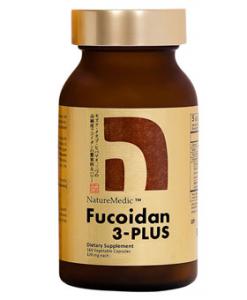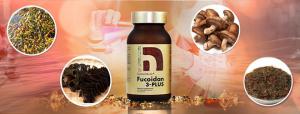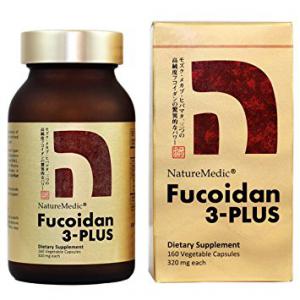The Positive Effects of Fucoidan from Mekabu, Mozuku and Fucus in Reducing Osteoarthritis Symptoms by Dr Susana Trujillo
Osteoarthritis is the most predominant form of arthritis.1 At the same time, osteoarthritis is one of the most common chronic health conditions among adults.
Supplementation with fucoidan decreased the leptin and IL-1β levels. These studies suggest that the oral administration of Fucoidan may improve meniscal/ligamentous injury-induced osteoarthritis. ”
NEW YORK, NY, UNITED STATES, January 31, 2019 /EINPresswire.com/ -- Osteoarthritis has an inflammatory element affecting the synovium (the soft tissue that lines the spaces of diarthrodial joints, tendon sheaths, and bursae) and cartilage, which leads to subchondral bone tissue breakdown, resulting in pain, stiffness, and joint failure.2 Several studies have suggested that osteoarthritis joint degeneration occurs from a combination of mechanical stresses and biochemical factors.3 Chondrocytes as well as synovial cells, in an elevated osteoarthritis condition, express inflammatory cytokines such as interleukin (IL)-1β and the tumor necrosis factor (TNF)-α. As a result, there is an increase in the matrix metalloproteinase (MMPs) and some pro-inflammatory cytokines such as IL-8, IL-6, prostaglandin E2, and nitric oxide.3— Dr. Susana Trujillo
Osteoarthritis models can be classified into primary (spontaneous) and secondary (post-traumatic OA, including induced models) osteoarthritis.4 At the same time, obesity has long been recognized as a potential risk factor for osteoarthritis, especially in the knees. By increasing the mechanical forces across weight-bearing joints, obesity or the excess of body weight may lead to cartilage degeneration. Other causes such as inflammation and lipid metabolism disorder in obesity are also associated with osteoarthritis. Recent studies reported that inflammatory cytokines such as leptin, adiponectin, and IL-1β are involved in obesity-associated in osteoarthritis.2,4
Various approaches used to treat osteoarthritis include non-pharmacological and pharmacological treatments. Pharmacological treatments include analgesics or anti-inflammatory agents such as acetaminophen, cyclooxygenase (COX)-2 inhibitors, glucosamine/chondroitin sulfates, non-selective non-steroidal anti-inflammatory drugs (NSAIDs), and intra-articular (IA) corticosteroids. Still, these treatments have side effects, for example, NSAIDs are correlated with an increased risk of cardiovascular (CV), severe gastrointestinal (GI), and renal injuries. Based on the diverse and various side effects, various studies have focused on functional foods for the treatment and prevention of osteoarthritis, which may result in the promotion of cartilage health and safety, even after long-term use.1,3
A very interesting and helpful functional food is known as Fucoidan. Fucoidan is a sulfated polysaccharide that contains L-fucose and sulfate groups and found in various species of brown seaweed such as Cladosipohon okamuranus (Mozuku), Undaria pinnatifida (Mekabu) and Fucus vesiculosus (Fucus). Because of their pharmacological properties such as the antioxidant,9 anti-tumor,9 anti-inflammation,10 anti-diabetic,10 and anti-obesity properties,7 Fucoidan has gained significant attraction. Recent studies indicated that Fucoidan has the potential to suppress inflammation in collagen-induced osteoarthritis. Furthermore, Fucoidan is potent as a therapeutic agent that provides hypolipidemic and anti-inflammatory properties.
Fucoidan obtained from brown seaweeds shows promise in taking on aspects of osteoarthritis and rheumatoid arthritis.6 In another study, a team of researchers looked at the effect of Fucoidan on markers of rheumatoid arthritis in laboratory conditions and published their findings in Inflammation. Their findings concluded that: “Fucoidan may have therapeutic potential in the treatment of rheumatoid arthritis.”7 Additionally, a third study looked at the effects of fucoidan on symptoms and inflammatory cytokine activation in 40 rats with osteoarthritis. The scientists found “that administration of fucoidan prevents the progression of osteoarthritis” in the rats. These results were published in The Journal of Medicinal Food.6
Fucoidan extracted from Mekabu, Mozuku and Fucus showed anti-inflammatory effects on osteoarthritis induced inflammation. The hypolipidemic properties worked against fat accumulation and protected the joint and cartilage on osteoarthritis induced male rats. In addition, supplementation with fucoidan decreased the leptin and IL-1β levels. These studies suggest that the oral administration of Fucoidan may improve the obesity and meniscal/ligamentous injury-induced osteoarthritis. At the same time, Fucoidan also can enhance the immune system and to improve the Quality of Life in people with osteoarthritis.
References:
1. Cross, M.; Smith, E.; Hoy, D.; Nolte, S.; Ackerman, I.; Fransen, M.; Bridgett, L.; Williams, S.; Guillemin, F.; Hill, C.L.; et al. The global burden of hip and knee osteoarthritis: Estimates from the global burden of disease 2010 study. Ann. Rheum. Dis. 2014, 73, 1323–1330.
2. Allen, K.D.; Golightly, Y.M. Epidemiology of osteoarthritis: State of the evidence. Curr. Opin. Rheumatol. 2015, 27, 276–283.
3. Barve, R.A.; Minnerly, J.C.; Weiss, D.J.; Meyer, D.M.; Aguiar, D.J.; Sullivan, P.M.; Weinrich, S.L.; Head, R.D. Transcriptional profiling and pathway analysis of monosodium iodoacetate-induced experimental osteoarthritis in rats: Relevance to human disease. Osteoarthr. Cartil. 2007, 15, 1190–1198.
4. Henrotin, Y.; Kurz, B. Antioxidant to treat osteoarthritis: Dream or reality? Curr. Drug Targets 2007, 8, 347–357.
5. Krasnokutsky, S.; Attur, M.; Palmer, G.; Samuels, J.; Abramson, S.B. Current concepts in the pathogenesis of osteoarthritis. Osteoarthr. Cartil. 2008, 16, S1–S3.
6. Lee, D.-G.; Park, S.-Y.; Chung, W.-S.; Park, J.-H.; Hwang, E.; Mavlonov, G.T.; Kim, I.-H.; Kim, K.-Y.; Yi, T.-H. Fucoidan prevents the progression of osteoarthritis in rats. J. Med. Food 2015, 18, 1032–1041.
7. Kuyinu, E.L.; Narayanan, G.; Nair, L.S.; Laurencin, C.T. Animal models of osteoarthritis: Classification, update, and measurement of outcomes. J. Orthop. Surg. Res. 2016, 11.
8. Dobashi, K.; Nishino, T.; Fujihara, M.; Nagumo, T. Isolation and preliminary characterization of fucose-containing sulfated polysaccharides with blood-anticoagulant activity from the brown seaweed hizikia fusiforme. Carbohydr. Res. 1989, 194, 315–320.
9. Millet, J.; Jouault, S.C.; Vidal, B.; Sternberg, C.; Theveniaux, J.; Mauray, S.; Fischer, A.M. Antithrombotic and anticoagulant activities of a low molecular weight fucoidan by the subcutaneous route. Thromb. Haemost. 1999, 81, 391–395.
10. Park, H.Y.; Han, M.H.; Park, C.; Jin, C.-Y.; Kim, G.-Y.; Choi, I.-W.; Kim, N.D.; Nam, T.-J.; Kwon, T.K.; Choi, Y.H. Anti-inflammatory effects of fucoidan through inhibition of NF-κB, MAPK and AKT activation in lipopolysaccharide-induced BV2 microglia cells. Food Chem. Toxicol. 2011, 49, 1745–1752.
Dr. Susana Trujillo
Dr. Susana Trujillo
+1 9292154000
email us here
Legal Disclaimer:
EIN Presswire provides this news content "as is" without warranty of any kind. We do not accept any responsibility or liability for the accuracy, content, images, videos, licenses, completeness, legality, or reliability of the information contained in this article. If you have any complaints or copyright issues related to this article, kindly contact the author above.



